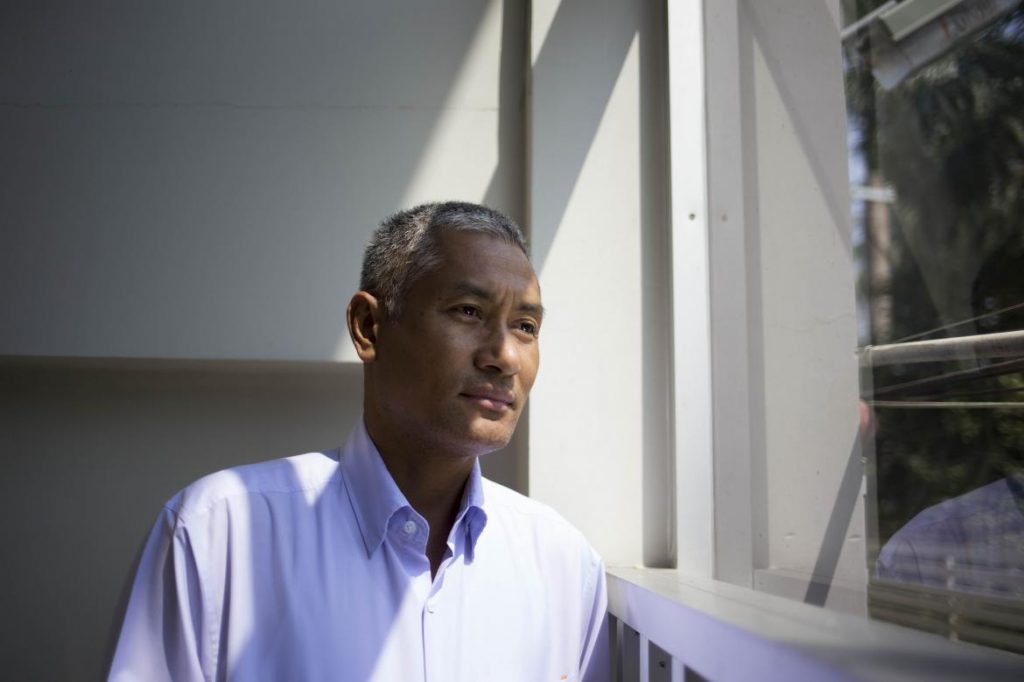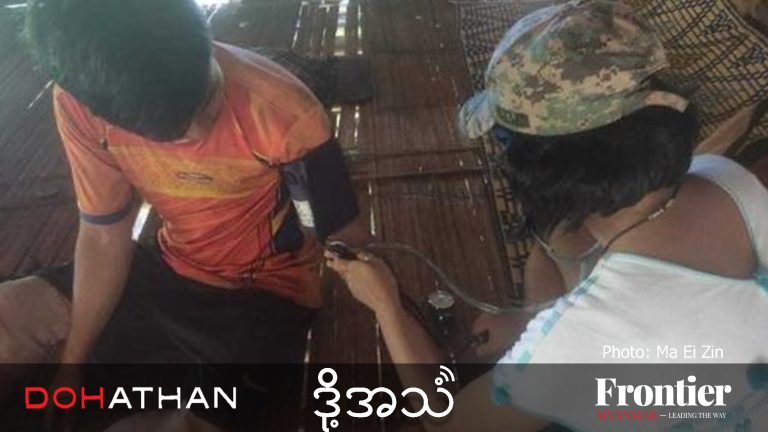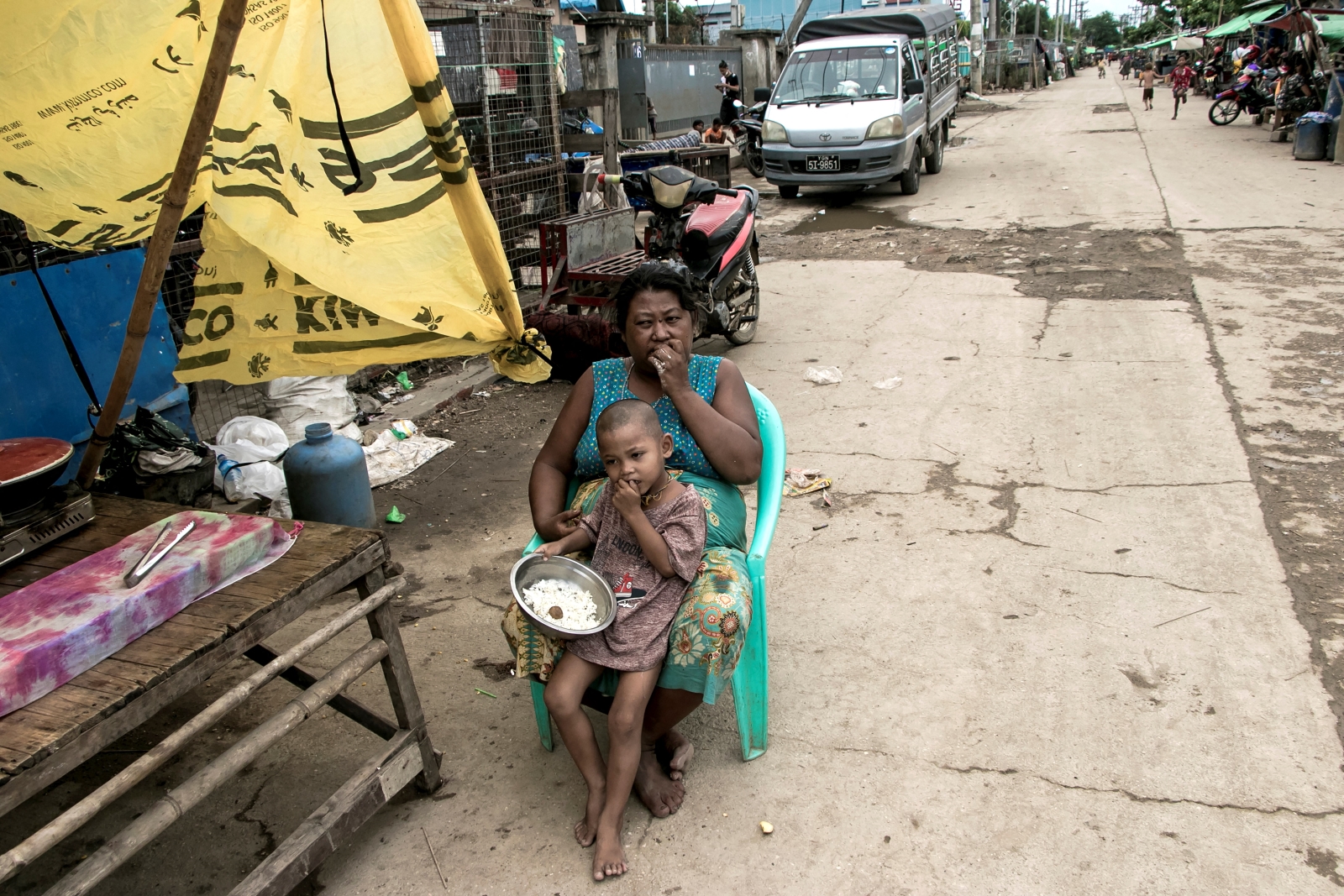Former anti-government rebel Aung Naing Oo has been playing a key role in helping to end years of armed conflict through his work with the Myanmar Peace Center.
By FRONTIER
“The armed conflict has been a waste of money, a waste of time and a waste of energy,” U Aung Naing Oo said of the various wars waged in Myanmar since it gained independence nearly 70 years ago. “It is not economically productive, so if we want to catch up with other countries in the region, we need to end the war as soon as possible,” he said.
For the past four years, U Aung Naing Oo has been contributing to the effort to end the fighting through his work at the Myanmar Peace Center, where he is the director of the peace dialogue program. The MPC was established by President U Thein Sein in 2012 to facilitate dialogue between the government and ethnic armed groups.
It has achieved some success, but not the legacy of an inclusive national peace accord that U Thein Sein had hoped to clinch before his term ends on March 31. In October, eight armed ethnic groups signed a nationwide ceasefire agreement with the government. Some of the country’s largest and most powerful armed ethnic groups refused to sign and fighting continues, notably in Kachin and northern Shan states.
The MPC enjoyed a good relationship with the outgoing government – it was one of 33 organisations to receive a 2016 President’s Excellent Performance Award in early February – but it is not clear what role the centre will play under a government led by the National League for Democracy. There is known to be some tension between the NLD and the MPC.
Support more independent journalism like this. Sign up to be a Frontier member.
“We are still in discussion [about what role the MPC will play]. But whatever happens, we have amassed an incredible amount of experience in the past four years and we’re not going to let all this experience and expertise go to waste,” U Aung Naing Oo said.
NLD leader Daw Aung San Suu Kyi said in a speech marking Independence Day on January 4 that building peace would be the “first priority” of a government headed by her party. Questions have been raised about the capacity of the NLD to take a leading role in a process in which it has so far had little involvement.
“It’s a good question,” said U Aung Naing Oo. “They were not part of the ceasefire negotiations, but all sides understand the importance of the NLD and Daw Aung San Suu Kyi in the peace process,” he said.
U Aung Naing Oo was a graduate student at Yangon University in 1988, when anti-government protests escalated into a national uprising. After the military seized power in September that year and brutally suppressed the protests, he was one of thousands of activists who fled to the border with Thailand.
He spent 11 years in the jungle with the All Burma Students Democratic Front before heading overseas to study at the University of New South Wales and Harvard University. When he returned to Myanmar in 2012, he and his fellow alumni were dubbed the “Harvard Mafia”.
‘Symbol of reconciliation’
U Aung Naing Oo said he regards the MPC as a “symbol of reconciliation”. He is one of five key MPC staff, all former members of anti-government groups, who work closely with President’s Office Minister U Aung Min, a former Major-General whom U Aung Naing Oo would have once regarded as his sworn enemy.
The MPC has attracted criticism for being too close to the government, but U Aung Naing Oo is undaunted.
“You develop a thick skin if you work in the peace process,” he said. “We are a highly polarised country. We have the government, who many people think are an extension of military rule. But for us, peace is bigger than anyone.”
“For people who do not understand the complexity of the peace process, it’s easy to blame this side or that side, but we cannot blame anyone. We are trying to bring an end to armed conflict.”
A major challenge facing the peace process is the huge diversity and interests of Myanmar’s 135 recognised ethnic groups.
“We are a multi-ethnic, multi-religious and multi-cultural country. Everyone wants to retain their own identity, so how do we create a common identity?” he said.
He referred to what U Aung Min has called “a beautiful bouquet of flowers” as the kind of country he wants Myanmar to be. “A mixture of yellow, red, green and blue, all with their beautiful smells,” he said.
Despite eight groups signing on to a national ceasefire accord, Myanmar is a long way from the beautiful perfume of peace and part of the bouquet is withered and desiccated. Armed conflict continues and it involves the Kachin Independence Army and the United Wa State Army, two of the biggest of the 15 groups involved in the peace talks that did not sign the NCA.
“We have diverse interests, huge geopolitical imperatives if you will,” U Aung Naing Oo said. “With the eight groups signing, that’s a big achievement. We have laid the foundations, so anyone else who wants to come in, it’s already there,” he said.
Since the NCA was signed two committees have been created to advance the peace process. The Joint Ceasefire Monitoring Committee (JCMC) is aimed at strengthening the ceasefires and the Peace Dialogue Committee is involved in the negotiations on federalism and power sharing.
“The national dialogue will be huge and the groups outside the process will have to come and join the club at some point,” said U Aung Naing Oo. “The government will continue to talk. Next week we’re going to Chiang Mai to talk to the non-signatories and will encourage the next government to talk to them; even if they come one at a time, that’s fine,” he said.
With distrust between the ethnic groups and the predominantly Bamar Tatmadaw still an issue, one question being raised is how can peace be achieved if fighting continues. In recent months, the Tatmadaw has been involved in offensives in various parts of the country.
“Yes, the Tatmadaw will have to find a way to bring them in [but] the Tatmadaw has an enormous stake in peace. They are committed to peace,” he said, adding that Commander-in-Chief Senior General Min Aung Hlaing has delegated seven generals to work with the JCMC and seven generals to work on the political dialogue, under the guidelines outlined in the NCA.
“Sometimes when things get out of hand, you talk to both sides, even if they are not on the ceasefire list,” U Aung Naing Oo said. “But the most important thing is the nationwide ceasefire agreement. If you sign the agreement, you have a seat at the JCMC and you have a seat in political negotiations,” he said.
Does that mean that if the non-signatories sign, fighting will cease?
“It will take a little while, the fighting will not stop immediately. But what it will provide is all stakeholders with an avenue to sit down and talk about the issues,” he said.
“The ethnic minorities have a lot of grievances, but if you talk to the people in the army, they also have their grievances. So when someone wants to tell you their grievance, you have to listen, to understand and to emphasise,” he said, adding that is a skill he has seen in U Aung Min. “There are a multitude of reasons – personal, geopolitical and organisational – why groups have not signed,” he said.
Civil society grievances
Those on the battlefield are not alone in having grievances about the peace process. In an open letter issued ahead of the five-day Union Peace Conference in Nay Pyi Taw last month, more than 100 civil society groups called for a delay in political dialogue until fighting stopped and greater civil society engagement.
U Aung Naing Oo said civil society groups had been approached many times but the MPC’s mandate limited it to a negotiating role and not making final decisions. Civil society will play an important role in the national dialogue, he said.
“What we have tried to do is accommodate everyone as much as we can, that’s why we have created this open dialogue culture,” he said.
Another sensitive issue is DDR (disarmament, demobilisation and reintegration), with the Tatmadaw urging ethnic armed groups to surrender their weapons, even as fighting continues.
U Aung Naing Oo said he understood the controversy over the issue and that it needed more discussion.
“With regards to DDR, sometimes you come up with an agreement with a leader, but you then ignore the rank-and-file, who make up the bulk of the organisation. When you have people underneath who may not like the deal, what is likely to happen is they go back and pick up their weapons, and you are likely to end up fighting the same enemy again,” he said.
“Without political agreement you cannot start DDR programs. So we cannot start DDR now, but we can start talking about it. This is a demon we have to deal with if we want to end the war in this country.”
War economy
U Aung Naing Oo said a significant, and often ignored, obstacle to achieving a lasting peace is the war economy. Even by conservative estimates, the illegal export of timber and jade, as well as drug trafficking, generates tens of billions of dollars in revenue, some of which helps to sustain armed ethnic groups.
“We cannot underestimate the role of geopolitics here,” he said, declining to elaborate. “People really don’t understand the role the war economy has played in fuelling the fighting.”
The war economy is referred to indirectly in the peace talks in discussions involving resource sharing.
“I think it will take a long time for any government to bring normalcy to these areas,” U Aung Naing Oo said. “We have been in conflict for almost 70 years, and I wouldn’t be surprised if it’s another 10 years before we bring some sort of normalcy to those areas.”







